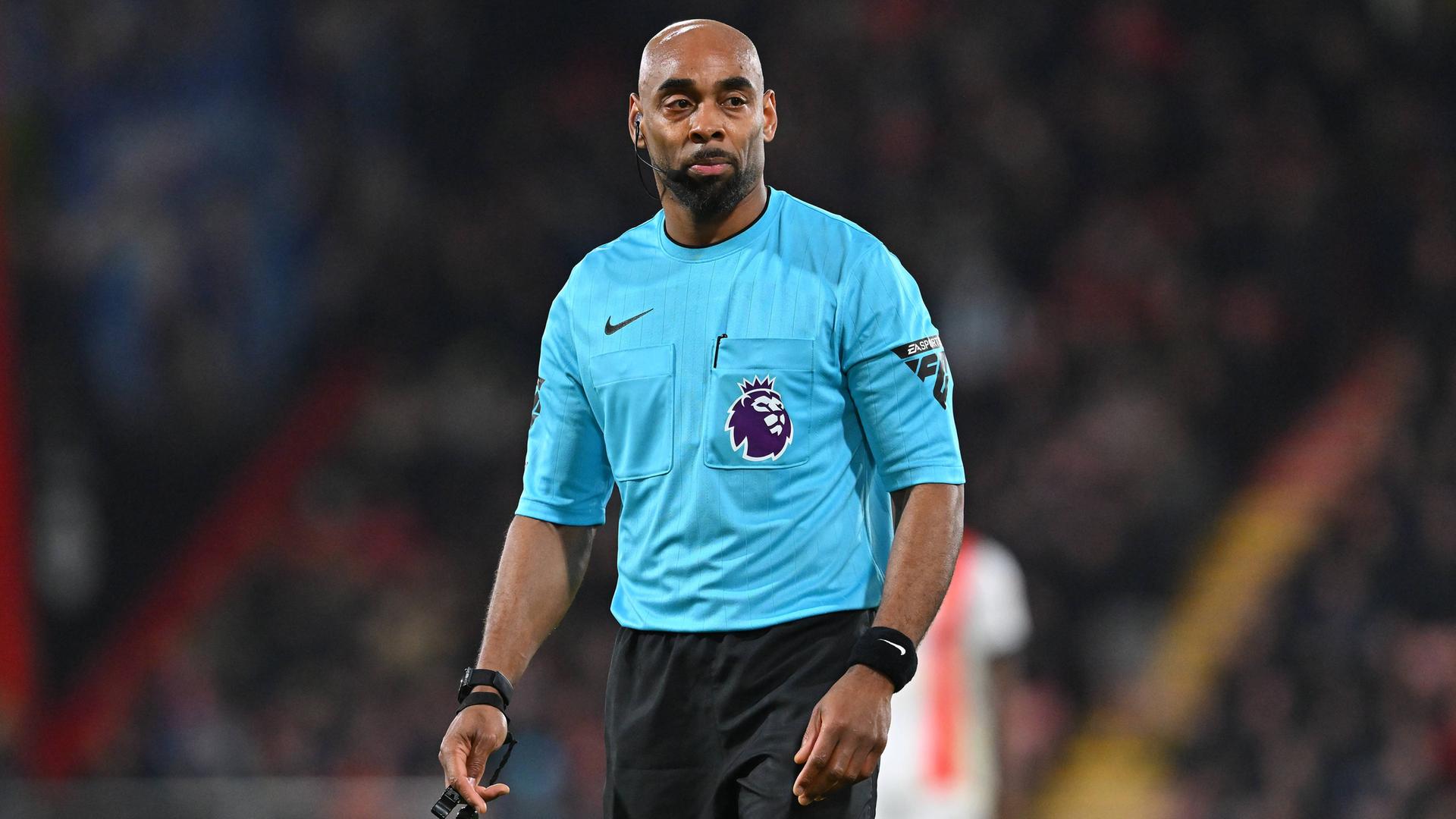Sam Allison referees the Premier League game between Bournemouth and Luton Town. (IMAGO / Pro Sports Images / IMAGO / Graham Hunt)
December 26, 2023 is a historic day. Sheffield United plays against Luton Town. And Sam Allison is refereeing his first game in the Premier League. He is only the second black referee in the history of the English top league, which was founded 32 years ago.
Sam Allison is 43 years old. He was a good footballer, but not a very good one. It was only at the end of his playing days, in his early 30s, that he decided to become a referee. He continues his education, is promoted, and quickly progresses to higher classes. Allison has long earned his living as a firefighter.
In this way, he becomes a role model for others, says Joel Mannix, the founder of a network for black and Asian referees: “I know Sam personally and I know that he worked very hard. Unfortunately, there are still many barriers. We should change the way we recruit and keep the talent in the structures in the long term. Then the representation also increases. If you don’t see black referees in public, then young people are missing role models.”
The pressure can be discouraging
Joel Mannix and his colleagues researched figures for the top leagues of English football: In the past almost 150 years, only nine non-white referees have been active there. The advocacy group around Mannix is now organizing conferences for more diversity. For example, in the Aston Villa stadium in Birmingham. In the VIP room, black referees from different leagues talk about their everyday lives. About spectators in the countryside throwing beer bottles. About groundskeepers who don’t want to call the police after racist hostilities. About scrutinizing looks and derogatory hand movements.
“When I was 16, I refereed my first adult game. That was discouraging. “Still, I wanted to be in the Premier League as a referee,” says Ashley Hickson-Lovence, 33, and talks about his beginnings as a referee. And from his great role model: Uriah Rennie was the only black referee in the Premier League until his retirement in 2008.
Hickson-Lovence can identify with Rennie. Both have ancestors in the Caribbean and experienced racism at an early age. As referees, both come across “unconscious bias”. “There are a small number of referee observers who evaluate our performances and who are racist,” says Hickson-Lovence. “When I was under scrutiny as a referee, I felt like I had to work three times as hard as my white colleagues. When I wasn’t being watched, I had a great time. This pressure can be demoralizing in the long term. You lose self-confidence.”
A novel about the great role model
Ashley Hickson-Lovence no longer wants to subject herself to this pressure. After eleven years as a referee, he will referee his last game in 2019. His main job is as an author. In his novel “Your Show” he combines the biography of Uriah Rennie with fictional elements and his own experiences. And in his free time, Hickson-Lovence now works as a referee observer. He says: “Right after my last match as a referee I sent out emails asking: How can I become an observer? After all these years, I was tired of older white men judging me less on performance and more on looks. I want to help change that.”
Ashley Hickson-Lovence has refereed football matches for eleven years. He now earns his living as an author and is also a referee observer. (Photo: Ronny Blaschke)
For several years now, associations and clubs in England have been developing concepts and campaigns to increase diversity beyond the playing field. But black people are still underrepresented in many areas: in coaching staffs and sports medicine, with sponsors and football media. But for many activists, change is not happening quickly enough. They have created their own networks in which they feel safer and more confident. Networks for black referees, managers or sports journalists.
Network wants to drive change
Long-time reporter Leon Mann is a pioneer for this. He says: “For more than ten years we stood outside the system and made demands. But we came to the realization that we had to go into the structures to change the culture. Football leaders should realize that we are impatient. It is also not enough for the clubs to put their diversity measures on the website and then wait. We need to get out into the communities and explain our plans in detail.”
The journalist Leon Mann co-founded the “Football Black List” platform. He is committed to a change in English football culture and the participation of black people. ((Photo: Ronny Blaschke))
Leon Mann is one of the founders of the “Football Black List”. This network wants to go beyond symbolic actions against racism. With workshops, scholarships, mentoring programs. So that years don’t have to pass again until the next black referee makes it into the Premier League.
